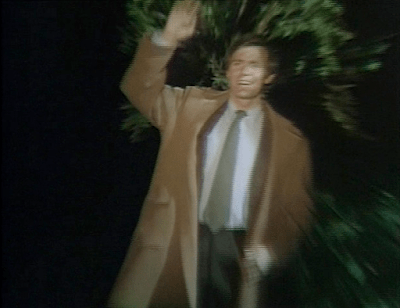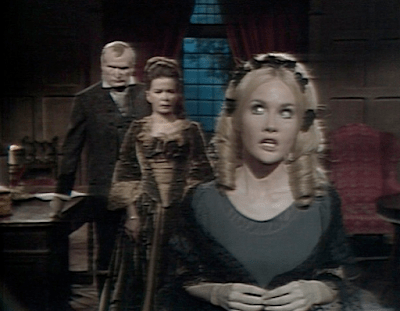At the end of Friday’s episode, the well-meaning Vicki Winters was driving her car and bickering irritably with her passenger, Barnabas Collins the vampire. Barnabas wants to elope with her, which she doesn’t object to doing. But first she insists on running an errand in his old neighborhood, the deserted cemetery north of town, and he hates that idea.
A pedestrian wandered into the middle of the road. To keep from hitting him, Vicki had to slam the brakes so hard she lost control of the car and crashed. At least she learned the lesson of the cowardly Roger, who ran over a pedestrian years before the show even started and as punishment was condemned to spend months looking for some guy’s fountain pen.
Today, Vicki and Barnabas are in the hospital. We see Barnabas in bed, moaning alternately for Vicki and his long-lost love, the late Josette. It doesn’t bode well for the planned elopement that in his delirium Barnabas gives Vicki only equal time to Josette. We then see Vicki in her bed, moaning for Peter, an unpleasant young man she got to know recently while visiting the late eighteenth century. She doesn’t mention Barnabas’ name at all.
Vicki comes to and finds Peter at her bedside. He denies that he is Peter, claiming merely to be a strange man who let himself into her room to watch her sleep. She recognizes him not only as her boyfriend from the 1790s, but also as the wayward pedestrian involved in the crash. He admits to this, but will not answer any of her questions.
A nurse enters and finally gets Peter to leave Vicki’s room. Perhaps he will let himself into other girls’ rooms and stare at them while they sleep. The doctor, a man named Lang, comes in.
Dr Lang asks Vicki if she knows Barnabas well. This is an interesting question. Before he bit her on Tuesday, Vicki definitely did not know that Barnabas was a vampire. Her behavior towards him since has been so blasé, not only by contrast with the behavior of his other victims but also by contrast with the eager friendliness and habitual deference she had always shown him in the many months they have known each other, that we can’t tell if she has learned that he is one even now. Indeed, we have no idea what Vicki thinks is going on between her and Barnabas, and as a result their scenes together have been pure comedy.
Vicki nibbles on her index finger and thinks for a moment about Lang’s question. Since they were going off to spend the rest of eternity together, it would be pretty embarrassing for her to admit that she doesn’t really have much understanding of Barnabas, so she says that she does know him well. As she does so, she glances away for a moment, and the light flashes off her eye, emphasizing her unease.

Lang asks about Barnabas’ health before the crash. Vicki puts her hands down and stutters slightly as she says “He was in excellent health.” A note of uncertainty gives her voice a childlike quality. When Lang replies with “Really?,” her voice sounds even more childlike when she answers “Y-yes, have you discovered something Mr Collins didn’t know about?” Lang says that he thinks Barnabas knew about it.
Lang looks at Vicki’s neck and finds the marks of Barnabas’ bite. They are just two dark dots, not conspicuously different from the last stages of an ordinary hickey.

When Lang asks about the marks, Vicki’s grogginess suddenly vanishes and she becomes hyper-alert. Since Vicki has been so bland about her experience with Barnabas, returning viewers might well expect her to answer Lang’s questions about the bite marks by saying that Barnabas gave them to her when they were making out. Instead, she gets defensive, at first denying that she remembers how she got the marks and then asking “What’s wrong with them? Why are they so bad, please tell me?” Alexandra Moltke Isles reads that line brilliantly. There is a touch of defiance in her voice, but also a sincere question- she genuinely does not see any reason she should have to hide the marks or explain them to anyone.
Early in the episode, the telephone rang at the great house of Collinwood, and long-term houseguest Julia Hoffman answered. It was the nurse, reporting that Vicki and Barnabas had been brought in after a traffic accident and that “Mr Collins is on the critical list.” Now Julia is in Barnabas’ room trying to arrange transport to his house. Lang comes in and is astounded at the thought of taking an unconscious patient, who is in critical condition, out of the hospital.
Lang and Julia have a showdown. Lang makes it clear that he knows that Barnabas is a vampire, and has deduced that Julia, who is a doctor doubly qualified to practice as a psychiatrist and a blood specialist, has been trying to cure him. Lang marvels that Julia has been treating “a legendary condition.” He asks to examine her neck; she never removes her scarf, surprising returning viewers who know that Barnabas has not bitten her. He continues to pose direct, well-informed questions, which she continues to parry with lies and evasions. She grits her teeth when he refers to Barnabas as “our patient.” At the last, she agrees to go, and he agrees to keep the room dark.
Barnabas awakens and sees Lang. He becomes agitated and demands to be released. Lang refuses. Lang tells him the time is nearly four o’clock. Dawn broke in central Maine at 4:33 on the morning of 8 April 1968, so Barnabas has little more than a half hour to get back home to his coffin. It is no wonder that Barnabas puts on his murdering face when Lang will not let him go. Lang backs away and says he must explain something Barnabas does not understand. Lang reaches the window. As he opens the heavy curtains, he intones, “Yes, it is four o’clock! But it is FOUR O’CLOCK- IN THE AFTERNOON!!” The sunlight floods the room. Barnabas screams and covers his eyes with his hands. But he does not turn to dust- he is no longer a vampire.

This marks the end of the epilogue to the 1795 segment, and with that the end of Dark Shadows 3.0. Unlike version 1.0, which ended with no unresolved story threads of any interest, and version 2.0, which ended at a moment when the only way forward was the annihilation of all the characters, they have cued up at least three major storylines. Eventually Peter will stop pretending to be someone else and something will happen between him and Vicki; Roger will bring wicked witch Angelique home with him; Lang and Julia will work together to manage Barnabas’ aftercare. There are several other characters available for story-building. We have met kindly eccentric Professor Stokes and expect him to contribute to some or all of these storylines. We do not know how Barnabas’ cure will affect his blood thralls Vicki and Carolyn. Carolyn’s relationship with Humphrey Bogart-esque lawyer Tony is in an awkward spot, and Tony is in a position to trigger a major storyline if he starts telling people what he thinks he knows about Carolyn and Barnabas.
On his blog Dark Shadows Every Day, Danny Horn often identified Addison Powell, who plays Lang, as “THE WORST ACTOR EVER TO APPEAR ON DARK SHADOWS.” I don’t think he deserves that title. In fact, he isn’t even the worst actor in this episode. I’m sure the Nurse was written to be pretentious and silly, but Katharine Balfour’s stiffness and relentlessly exaggerated vocal mannerisms are simply excruciating. Powell isn’t great, and will get much, much worse, but he is basically competent today. Mrs Isles, Jonathan Frid, and Grayson Hall all do excellent work in their scenes with him, and he never once gets in their way. But when Balfour is on stage, the others can do nothing but stop and wait for her to leave. She had an extensive stage career, so I suppose she must have played many parts well, but she is stupefyingly bad today.
After Lang’s big “FOUR O’CLOCK- IN THE AFTERNOON!!,” we cut to the closing credits. Under them is a set where a clock’s hands indicate four. From April 1967 to July 1968, ABC suggested its affiliates run Dark Shadows from 3:30 to 4:00 PM. There were a great many stations which insisted on showing it at 10:30 AM. While it was a hit by this point in the 3:30 slot, its ratings were always rock bottom where it was shown in the mornings, so the great majority of viewers would have seen the correct time as they read the names of the people who worked on the show.
















